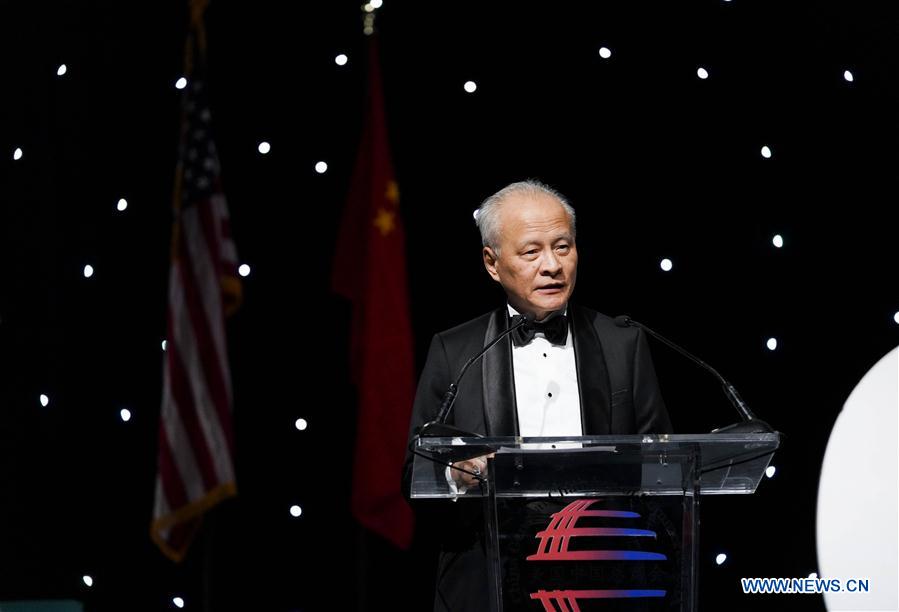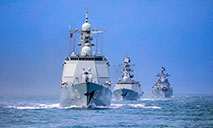Cui: China not looking to rule the world

Cui Tiankai, the Chinese ambassador to the United States, addresses the 15th anniversary and Chinese Lunar New Year gala of China General Chamber of Commerce-U.S.A. in New York, the United States, Jan. 8, 2020. (Xinhua/Wang Ying)
China has never made it a national strategy to replace any other country, and it opposes dividing countries into different camps, Beijing's top envoy in Washington said on Thursday, hours after US President Joe Biden said the East Asian nation aims to be "the most powerful" in the world.
Biden, in his first White House news conference, said China has an "overall goal to become the leading country in the world, the wealthiest country in the world, and the most powerful country in the world".
"Our goal is to meet the growing aspiration of the Chinese people for a better life. Our goal is not to compete with or replace any other country," Chinese Ambassador to the US Cui Tiankai said.
"This is never our national strategy. Hopefully, people could have a better understanding of this," he said when asked by CNN's Christiane Amanpour to comment on Biden's remarks.
Biden also said that the US is "not looking for confrontation" with China, but there will be "steep competition" and insisted China play by the international rules such as fair competition, and that the US would re-establish its alliances, an effort he said he had told Chinese President Xi Jinping is "not anti-Chinese".
Cui said that what today's world wants, and tomorrow's world would want is to join efforts by all countries to build a community of nations for a shared future.
"We don't think any attempt to divide the world into different camps or even build a confrontational military approach, we don't think this kind of approach is a solution. Actually, this is a problem in itself," he said.
Such an attempt will not help the world in dealing with myriad challenges, including the COVID-19 pandemic, climate change, poverty, terrorism and building a more open, inclusive and sharing global economy, according to the envoy.
"So we believe our future lies in the joint efforts to build such a global community, not to divide the world into different camps," he said.
Cui, who was a member of the Chinese delegation to have a dialogue with leading US diplomats in Anchorage, Alaska, last week, said the meeting was "timely" and "helpful" in terms of enhancing mutual understanding.
"I hope this will be the beginning of a long process of dialogue, communication and hopefully coordination between the two sides," he said.
The ambassador said China "very much" stands for open and fair competition, but that is not possible when Chinese companies are discriminated against, with some senior executives detained without any reason, and when there are nationalism and protectionism against international rules and attempts to politicize everything.
"In order to have open, fair competition, I think these past mistakes will have to be corrected first. Otherwise, there's no basis to engage in such competition," Cui said.
As to international rules, Cui noted there are basic norms and rules that every country should follow, such as the fundamental principles for international relations set forth in the first chapter of the United Nations Charter.
The first principle set out in the UN Charter is sovereign equality of all its members, and another principle is the obligation of all the UN members to refrain from threats or use of force against the territory, integrity and political independence of any state.
"So if people are interested in these rules, maybe they should start by reading the charter first. If people really want to show us the power of example, I would suggest they could very well start with their own compliance with all these truly universally agreed principles," Cui said.
The ambassador also noted that China is "always open" for international cooperation, but any such cooperation will have to be based on equality, mutual benefit and mutual respect.
"How can people cooperate with each other, if they don't treat each other as equals? And this is not our problem. This is the problem for the Western countries. They still have to learn how to treat other countries, other races, other civilizations as equals," he said.
During the interview, CNN played a story about several children in China's Xinjiang Uygur autonomous region, who were reportedly separated from their families.
"I think it's very unfortunate, it's immoral, to take advantage of any particular family situation and manipulate it," Cui said. "This is not true journalism. It's very unfortunate for CNN."
The ambassador said he had been to Xinjiang more than once in recent years, and "what I saw is a very different story, a very different picture from their reporting".
"I saw a very different picture from some fabrications on the media. Until very recently, the biggest threat to Xinjiang was terrorist attacks," he tweeted later on Thursday. "We do not start wars or use missiles/drones to fight the influence of terrorist and extremist ideology."
Photos
Related Stories
Copyright © 2021 People's Daily Online. All Rights Reserved.










